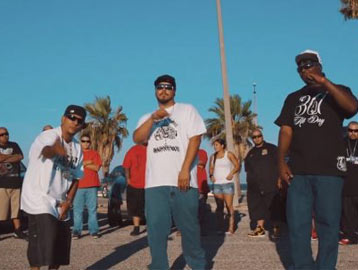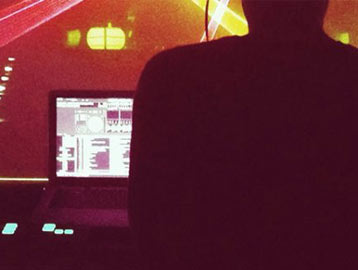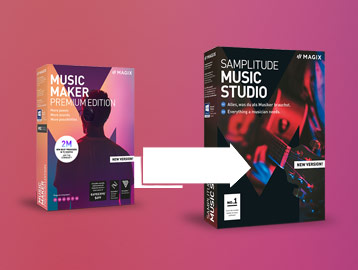NEW
Artist Interview: Brisk Fingaz

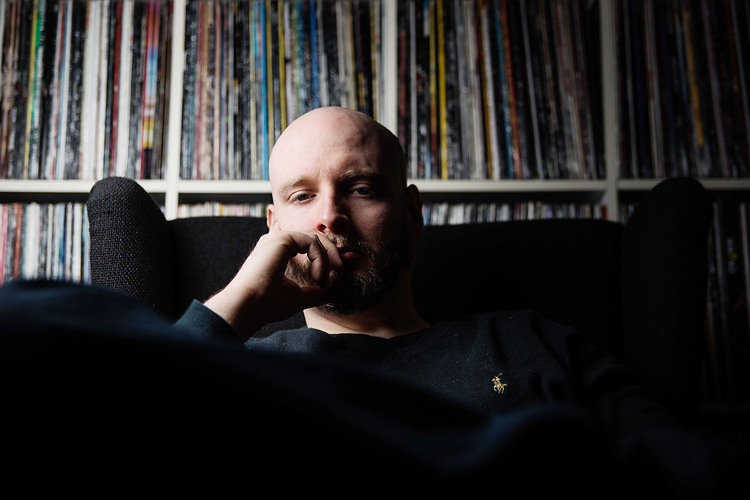
When you think about hip hop, the biggest acts come to mind. This is where the German hip hop scene differs greatly from its American counterpart. In the United States, producers and MCs can potentially receive the same amount of media attention while at the same time not being locked down into a single role. Examples such as Dr. Dre, Kanye West and P. Diddy come to mind here. But in Germany, producers tend to occupy a behind-the-scenes role in the hop hop industry.
One such producer is Kai Aschemann, otherwise known as Brisk Fingaz. The producer from Lower Saxony has been using Samplitude Pro X for 20 years and has produced beats for an impressive list of artists from all across Germany, including Kool Savas, Fler, Samy Deluxe, Kollegah, Farid Bang and Haftbefehl, just to name a few. He contributed to Kollegah and Farid Bang’s album “Jung, brutal, gutaussehend 2,” which went gold in Germany and Austria, as well as M. Pokara’s “À la poursuite du bonheur,” which went triple platinum in France and Belgium.
We sat down with Brisk Fingaz to get his take on “Deutsch Rap,” producing, creative collaboration with other artists and the current state of the hip hop industry.
Music — “Every time I collaborate with other artists, I come away with something new. Everyone has their own unique way of doing things.”
You’ve worked with a lot of well-known German hip hop artists, such as Samy Deluxe, Kool Savas, Sentino, Kollegah, Farid Bang, Fler, Azad, Haftbefehl and Pa Sports, just to name a few. Which collaboration was the most fun for you, and why?
I can’t really say exactly. There have been so many special moments. Every time I collaborate with other artists, I come away with something new, whether it’s in my studio or projects that go down online and over the phone. Everyone has their own unique way of doing things. Working with Kollegah and Farid Bang on “Jung, brutal, gutaussehend 2” was really cool, for example. Farid just called me up and told me to send him some beats. At the time, I hadn’t really been producing much, so I told him I wouldn’t be able to send him anything spectacular. But he insisted, so I sent a few things over to him. He called back and was like, “Brisk, you nailed it. We’ll take four beats for our album.” Working with Selfmade Records was nice. And the fact that the album shot straight to #1 and went gold shortly after that was a great experience.
Working with Massiv was a lot of fun. You could tell the guy was hungry. We worked really well together. Unfortunately, back then German rap wasn’t selling very well, and the album didn’t hit the numbers the label was expecting. When the label let him go, we went our separate ways.
I also had a lot of fun working as lead producer on an album called “Rettet die Welt” for an underground artist, Mr. Knight aka Das Grossmaul. That album came out in 2005. We really had a lot of fun in the studio, and I look back fondly on that time. That project was just about making music for the fun of it. We weren’t thinking about money — a central theme on the album.
And then there’s the 2006 album “Mittelweg” by F.R. (Fabian Römer). That one was fun too since we were friendly with one another and made really great music together. Geez, I could probably go on for hours talking about collabos that were fun (laughs).
How do you make your sounds? Do you use modified samples or do you use the MIDI keyboard a lot in combination with virtual instruments?
I come from a sampling background. I love the warm sound. Of course, I also put bass, string instruments, guitar — whatever fits — over top the sample using the keyboard. But for me the main thing is working with samples. I love cutting and changing them. Pitching up and down, creating something totally different. When I hear a sample that contains something special, I already have the beat in my head, and I know how it’s going to sound in the end. But I also have projects where I work exclusively with VSTs without using a single sample. I also like to let musicians record ideas I have that I can’t really play on the keyboard myself.
What are your favorite plug-ins / VSTs?
For producing I tend to use Kontakt from Native Instruments. There are a lot of add-on VSTs you can buy, and they have a huge selection of great sounds.
Other than that, you really only need Waves plug-ins or Universal Audio, and you’ve got everything you need.
What does your studio setup look like? Do you go more analog or digital?
Analog would be great, but I just don’t have the room for it in my tiny studio. Which is probably a good thing for my electricity bill. It would be awesome to record with a tape machine and get that authentic 90s sound, but it would take too much time and effort, and I’d have to learn how to do it first. So, I just take the easy route and do everything digitally. Even my MPC Renaissance is just a controller which I use alongside Samplitude. The mixer in Samplitude is so awesome that you don’t even need an external mixer, especially with all the plug-ins that are available today. Plus, I don’t think it would make sense to spend the time and money on analog equipment, since the payoff wouldn’t be big enough. And kids today wouldn’t hear the difference anyway since they’d rather listen to MP3s on their phones.

Samplitude — “It’s all super quick and easy with Samplitude.”
To what extent is Samplitude Pro X a central component of your production process? What are your favorite features, and what made you start using Samplitude?
A coworker of mine and I first bought Samplitude back in 1996 to produce and record music. Of course, a lot has changed since then. Back then it was supposed to just be a recording project or for radio stations, if I remember correctly. But I adopted my approach to recording from that period. Back then you didn’t have any BMP settings. I had to use the hi-hat from a drum sample to keep time, and I would take the length and then copy on top of that over and over again. Under that would go the bass drum, a track under that, and then the snare. I do things more or less the same way today, only with BMP settings and more elaborate drums.
I think the difference between Samplitude and other DAWs is that you can work with waves better and more quickly. My workflow includes a lot of work with waves. Setting the drums, cutting samples into the project, setting pitches, time stretching, cross-fading, and integrating VSTs. Or editing finished vocals, for example, by cutting doubled vocals if they don’t match up 100%. I do my mixing with the internal mixer or, if I need to, with the Mastering features. It’s all super quick and easy with Samplitude.
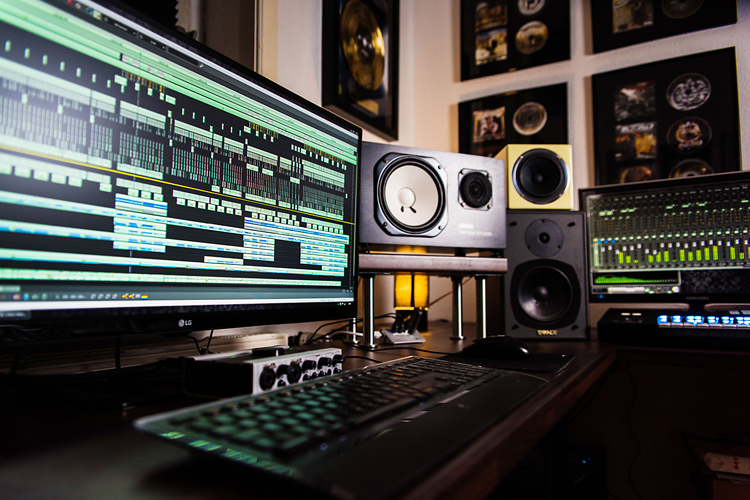
You mentioned that you really like the new time pitch feature in Samplitude Pro X3. Do you use it mostly to modify samples or for fixing recordings?
I really like using that feature for stretching out elements that are too short. Double vocals that end too soon, or even to make samples fit the song better. Or even with guitar recordings that aren’t perfectly in time — you can edit those perfectly without necessarily having to go to town on them with cross-fades. You just alter them with the time stretching feature. I also use the pitch feature a lot to get things more in tune. It’s really useful for elements that were recorded live.
Do you use a pre-defined workflow or do you approach projects more spontaneously?
I basically use the same workflow. I’ll usually search for a sample, and once I’ve found something, I’ll set the hi-hat to keep time, much like you would with a metronome or grid. Then I’ll cut the sample on top and flesh it out with drums, VSTs, etc.
For beats without a sample, it’s basically the same. The only difference is that I play the melody over the hi-hat. And once the melody is set, I’ll produce the drums.
Azad, Fler, Kollegah & Farid Bang “With Fler, for example, he came to my studio so that we could get to know each other and so that he could be there for the production and give his two cents.”
Can you give us an idea of what it’s like to work with Fler, Azad or Kollegah/Farid Bang? Do they come to you with vocals and ask you to produce beats for them? Or do you get together in the studio and work on the tracks together?
With few exceptions, I normally produce the beats first and send them to different artist so that they can pick something out for themselves. Then they write on the beat, record their vocals and send me a bounce so I can arrange the track. Once the artist signs off on it, I can send out the individual tracks. Or I’ll get the individual recording tracks, and I’ll send the complete song broken down into tracks to the mixer once the arrangement is finished. The exception is when artists come directly to me, or when we get together in the studio to record something. With Fler, for example, he came to my studio so that we could get to know each other and so that he could be there for the production and give his two cents. So, as I was producing the beat, he would tell me if he didn’t like something, since he had a very clear idea in his mind of what he wanted. Naturally, that makes my job as a producer a lot easier on collaboration projects. I generally think it’s nicer to have artist in the studio when it comes to putting the final touches on a song.
Back in the early 2000s things were nicer. Like, driving to Stuttgart with Bene from MB1000 so that he could record a feature part for Franky Kubrick over one of my beats. Or when I made scratches for Originalton (Oliver Schneider from Such a Surge) and was invited to Cologne specifically to record them in the studio with him. Those kinds of things stick with you. You have these emotional memories from them. But luckily we have high speed Internet today, so you don’t have to pay a courier to drive your files to another state anymore.
The track “Dissen aus Prinzip” by Kollegah & Farid Bang contains a pretty prominent electric guitar sound. Did you record that in the studio or is it a sample?
Originally it was a sample. But due to time limitations and sample clearing complications, we ended up recording a modified version of it in the studio. It was really hard for us to find the rather unknown German heavy metal band that originally recorded it. I ended up finding the guitarist on Facebook and tried contacting him, but he didn’t get back to me with the green light until right before the release. By then it was already too late. At least the sound was similar to the original sample thanks to Guitar Rig.
The track “Mucho Macho” by Patrick mit Absicht has really heavy drums. Can you tell us how you produced them?
Actually, I recorded the same way I just described. I layer drums. The reason they sound the way they do is because they fit what’s there (laughs). I really go with my gut feeling. I really like everything to fit. The beat was already a banger, so I just needed some drums to go with it.
You mentioned that there were musicians in the studio with you when you worked with Azad and Fler. How much of an extra challenge is that for you, since you’re used to producing your beats alone?
When I bring musicians into the studio, I already have an idea of what I want. For Fler and Azad, I brought in a keyboardist to play some parts that I couldn’t play myself. I tell him up front what I’m going for — specific octaves or whatever — and then I just let him play a bit. Then I look for parts that are in line with what I have in mind, and we gradually refine the whole thing.
How often do you make musical or aesthetic calls when you’re working with a rapper? Are you free to do whatever you want, or is it more about executing other people’s ideas?
Since I normally make the beats ahead of time, I get to make all the calls. When it comes to fleshing out the track, the artist always has the last say. But I seem to virtually always hit the right notes, so there are hardly ever any requests for changes. When I’m in the studio with an artist, they can give me pointers or we can come up with ideas together. This can potentially help move things along. If I’m the lead producer on an album, then I’ll also make suggestions on what to do or how to improve things. In the end we want everyone to be happy. Other than that, I don’t have anything to do with lyrics. Which can be tough in the rap scene, when rappers are dissing each other and you’re caught up in the middle, even though you’re not involved and don’t want anything to do with it.
Brisk Fingaz “I was addicted to scratching. And then I was addicted to producing.”
How did you get into hip hop? What fascinates you about it?
I was really into graffiti and tried my hand at it for a bit. But I realized pretty quickly that I wasn’t that good at it, so I stopped. Back then I listened to Die Fantastischen Vier and always thought scratching was awesome. The sound, the look of the turntables set up with the mixer in the middle. I loved everything about it. I knew I had to try it, and I had this Die Fantastischen Vier film record, “Die. 4. Dimension,” from Bravo, which was actually pretty good for scratching on top of real vinyl records. I started learning where the sounds started and getting a feeling for it. Then I showed a coworker of mine some of the stuff I had produced. He said he knew this really good DJ who was a few grades ahead of him, DJ CSP. We still keep in touch, and he’s been like a brother to me. He taught me all the basics, from the baby scratch to the transformer scratch. He was also how I found out about Samplitude. I was addicted to scratching. And then I was addicted to producing. The rest is history (laughs).
Everything about the culture fascinated me. It was an amazing time. Graffiti bombing. Going to jam sessions. Hanging out with 30 people in a place that’s completely tagged with marker and spray paint. The baggy pants, the huge jackets and timberland boots. The dark music. Mobb Deep, Wu-Tang, Cypress Hill, Cella Dwellas. The list goes on. That was a completely different lifestyle. One that I miss a lot sometimes. Rap music you hear on the charts today doesn’t have anything to do with hip hop.
What in your opinion is the essence of hip hop?
I can’t really say. There are just too many facets. I don’t want to say that its supposed to be about culture. No one wants to hear that anymore. Just dope beats and raps. Good flows and good bars.
Who are your personal role models when it comes to producing for hip hop?
Definitely DJ Premier. For me, he’s still one of the best producers around. Just doing his thing, with his own sound. And he’s still on top when it comes to his feeling for scratching. I don’t think there’s anyone who’s produced more for platinum and underground artists alike.
Are you totally in hip hop mode outside of the studio too? Or do you take breaks and listen to other genres?
I’m not in hip hop mode at all. Those days are gone. But I still prefer listening to albums from the 90s. But I’m also very open to other types of music. I’ll listen to anything except for Schlager or folk music. I also love 80s pop music.
Where do you find inspiration, and how do you deal with writer’s block?
Writer’s block sucks, and it’s annoying every time it happens. But that’s usually the start of something new. A period of growth. I take inspiration from all kinds of music. There are some many things you can use for rap music.
In the music scene and around friends, I assume you go by Brisk Fingaz — but for official occasions and for people who aren’t familiar with you as an artist, you’re probably Kai Aschemann. Are Kai Aschemann and Brisk Fingaz different people? If so, how?
I’d say I’m always the same person. There’s no difference. A lot of my coworkers call me Brisk instead of Kai.
Music industry/business “The first problem is that you don’t have to spend money anymore to make music.”
How did you put together the large network of artists you’ve produced for?
Firstly, by working for other artists. Pal One, for example. I produced the larger part of his 2005 album “Palwolf.” After that I got calls from Jonesmann, Azad and Kool Savas asking for beats. Things continued like that until Myspace came around. Then you could directly connect with artists. After that, Facebook.
Here’s a cliche question: is the hip hop business “harder” than it is in other genres?
For sure. I know a lot of people from other genres. I don’t think any other genre has as many people with criminal backgrounds or surroundings. The beefs need to be taken more seriously when they aren’t just on diss tracks. Of course, most of it is just promotion, but not always.
Have you seen the film “Wild Style” by Charlie Ahearn? It’s considered to be the first hip hop movie (documentary) ever, and is still a milestone today in terms of how it deals with the origins of hip hop culture. Who in your opinion have been the movers and shakers in hip hop when you compare the culture and music of the late 70s/early 80s with today?
I’ve seen the film, but it’s been so long that I can’t really say anything about it. And I wasn’t around to experience those times, so I can’t really add much there either. But if you watch movies and documentaries, you can see that there were definitely differences compared to the 90s, the early 2000s and today. Based on what I think I know, I’d say that back then you had the culture “hip hop,” which later split. And today that culture doesn’t exist anymore. But that’s just my opinion. I could also be wrong.
The “democratization of production” has allowed more and more people to buy production equipment for cheap and get together with others to make music. These changes in the production process are surely having an impact on professional studios. Do you think the role and expertise of the producer is also becoming more important now, since a lot of studios have the same equipment?
The first problem is that you don’t have to spend money anymore to make music. You load up a music program, some VSTs or plug-ins. PCs don’t cost that much anymore either. So you’re ready to go. There are so many beat makers out there that probably sell weed or collect unemployment to finance their careers. So, they don’t depend on money to produce music. They make beats, maybe one gets picked up by an artist. They’re not interested in money. Just the release. Knowing that you made a beat for your favorite rapper. And I can totally understand that, but it also destroys the business.
When I look back at the early 2000s and how much we made, and how prices dropped after sales tanked and MP3 downloads took off in the mid 2000s — things never really recovered after that. Sales are stable today and rap is the most successful genre there is, maybe expect for pop music. But since so many beat makers are just giving their beats away, there’s not much that can happen. It makes the business harder because it doesn’t matter in the end how professional you are. In the end it’s about money. A lot of artists are using beats that don’t cost anything just to make more money. The worst part is that you can’t even blame them. The problem is the producers giving their beats away for free or next to nothing.
More info:
Brisk Fingaz on Facebook: https://de-de.facebook.com/originalBriskFingaz
Brisk Fingaz on Soundcloud: https://soundcloud.com/brisk-fingaz
Brisk Fingaz Wikipedia Article: https://de.wikipedia.org/wiki/Brisk_Fingaz
Next Post >
Developer Interview: Robin Lobel
< Previous Post
Artist Interview: Bill Evans
Related Posts
Artist Interview: Killa-D
Rap artist and hip hop producer Killa D discusses his label, recording techniques for rap vocals and beats, as well as working with Music Maker.
Artist Interview – Trap producer Simtem
The Canadian producer Simtem about Trap talked with us about the music business and the Music Maker.
Artists Interview: Cyril Picard
A short interview with the French techno producer Cyril Picard about his musical roots and producing using Music Maker.
From Music Maker to Samplitude Music Studio
Use your Music Maker skills in Samplitude Music Studio. Here we tell all why you won’t regret an upgrade!
